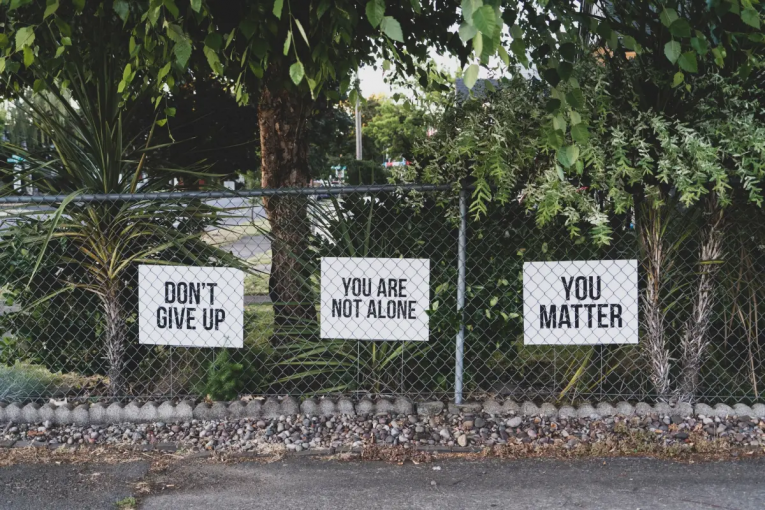

Surgeon General Dr. Nadine Burke-Harris and others spoke to prisoners about adverse childhood experiences.
By Steve Brooks
Compassion Prison Project (CPP) founder Fritzi Horstman and California Surgeon General Dr. Nadine Burke-Harris visited Valley State Prison (VSP) to talk to prisoners and officers about adverse childhood experiences, traumas that people experience when they are young and carry consequences later in life.
Horstman and a group of volunteers piloted a 12-part curriculum series called Trauma Talks.
“It was a three-day event that started with 100 men in blue in a giant circle in front of main control,” VSP resident Daniel Henson wrote in a letter to San Quentin News.
“CPP is on a mission to create trauma-informed prisons and communities that address trauma on both sides of the bars,” wrote Morgan Vicki Emmess in the workbook “Trauma Talks.” “Our dream at CPP is that all prisons in the United States become education and healing  centers within three years.”
centers within three years.”
“Trauma Talks” educates people about our physiology as human beings, and in particular about what happens to our brains and bodies when we are in a state of fight, flight or freeze. It focuses on adverse childhood experiences, or ACEs, to teach people that what happened to them while they were growing up has a direct effect on how they behave as adults today.
“It’s not that what they did was OK, absolutely not. It’s that we have to understand the mitigating circumstances,” Horstman told Spectrum News. “Those men aren’t bad people. They did bad things, but they are not bad people. They are highly traumatized.”
According to the Centers for Disease Control and Prevention, 97% of prisoners have had at least one traumatic childhood experience.
One in six males in prison reported being physically or sexually abused as a child, and many more witnessed traumatic events, according to a study done at Rutgers University’s Center for Behavioral Health Services & Criminal Justice Research.
Horstman does not aim to excuse prisoners for the behaviors that brought them to prison, but rather to help them heal the original traumas which may have influenced those behaviors, ultimately bringing about a safer society.
Many of the men Horstman met at VSP were abused as children and grew up in the foster care system. They survived on their own at a very young age.
“A lot of them had no one to love them,” wrote Emmess, “no one to take care of them or to teach them right from wrong.”
The men at VSP were questioned about their childhood experiences, according to Henson. The questions were related to verbal, physical, emotional and even sexual abuse. As the questions were read, men who had experience with the issue at hand were asked to take a step forward. Many of them stepped further and further into the circle.
“I sat down with Fritzi and told her about this book that changed my life called ‘The Body Keeps the Score,’” Henson said. “Fritzi’s eyes lit up. She said, ‘That’s the book that changed my life.’”
Dr. Bessel van der Kolk is the author of “The Body Keeps the Score.” He also now assists Horstman with CPP.
On the third day of the event, the circle was cut in half, and Dr. Burke-Harris stepped inside to speak to the men.
“Gov. Newsom sent me here to tell you all that you matter,” she said, according to Henson. “You have not been forgotten.”
Burke-Harris is the author of “The Deepest Well: Healing the long-term effects of childhood adversity.” She encouraged the men to focus on healing from the ACEs that led to their incarceration.
“Adverse childhood experiences are an epidemic,” Burke-Harris told Spectrum News. “It’s a public health crisis. It affects everything from our learning to our health, to our behavior to our mental health and development.”
According to Burke-Harris, more than 20,000 healthcare providers have been trained since January 2020 on how to treat patients with evidence-based interventions.
“We have the power to change outcomes. ACE’s are not destiny,” she said.
At San Quentin State Prison, men learn to process trauma and turn it into healing by participating in self-help programs like Guiding Rage Into Power (GRIP). The group was started by Jacques Verduin a decade ago. Verduin has graduated hundreds of men who have experienced childhood trauma.
“Focusing on trauma is the beginning of healing,” said SQ resident Arthur Jackson, who graduated from GRIP a few years ago and now helps facilitate the program. “It is the root of the problem.”
“Hurt people hurt people,” he said. “Without knowing how to identify and deal with the trauma in our lives, we stuff it until we end up lashing out and hurting others.”
Dennis Jefferson also graduated from GRIP and now helps facilitate the program.
“The way we act in the present moment is tied to whatever happened to us in the past,” he said.
“It all goes back to that original pain,” Jefferson continued. “Our bad behavior is always tied to past trauma, and we have to recognize it in order to stop the behavior.”
For Henson, meeting Horstman and Burke-Harris “was a historic event.”
There was a moment when many of the volunteers that visited VSP surrounded the men and held up signs that read “YOU MATTER.”
Tears started to flow down some of the men’s faces, wrote Henson. He believes it was probably the first time many of them heard those words.
This article was first published by San Quentin News, a newspaper that reports on rehabilitative efforts to increase public safety and achieve social justice from inside San Quentin State Prison

